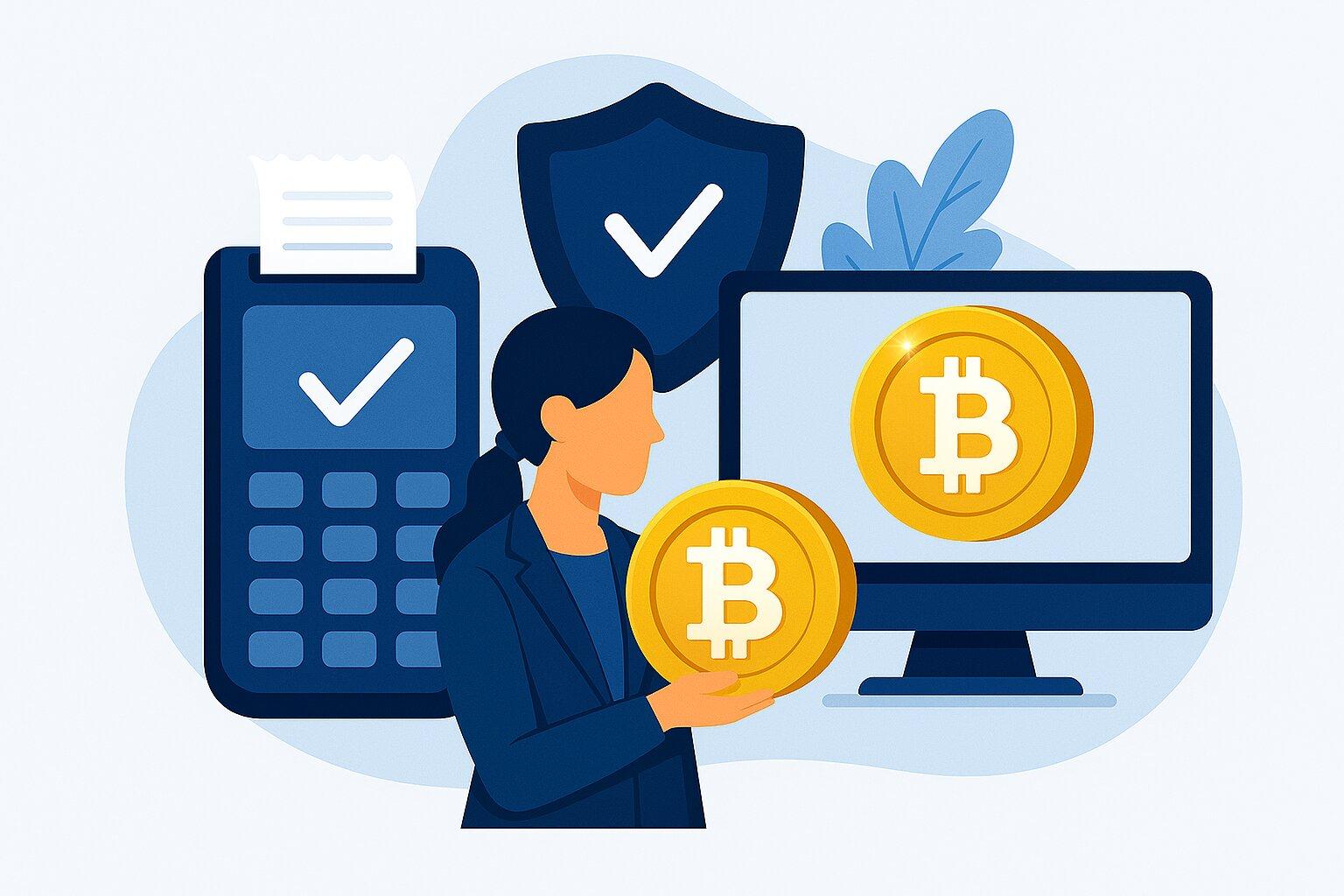
Is Bitcoin Payment Processing Safe for Businesses?

Bitcoin has gone from a fringe experiment to something serious businesses are starting to consider. But every time a company asks, “Should we accept Bitcoin?” the real question underneath is, “Is Bitcoin payment processing safe for businesses?”
Bitcoin has gone from a fringe experiment to something serious businesses are starting to consider. But every time a company asks, “Should we accept Bitcoin?” the real question underneath is, “Is Bitcoin payment processing safe for businesses?”
The answer isn’t just about avoiding fraud or security breaches. It’s about navigating volatility, compliance, infrastructure demands, and whether this technology aligns with your business model. Accepting Bitcoin isn’t a passing trend, it’s a strategic move that requires understanding both the risks and the rewards.
Quick Answer: Is Bitcoin Payment Processing Safe?
Yes, Bitcoin payment processing can be safe when done right. But “safe” means more than secure tech; it’s about the right infrastructure, regulatory compliance, and managing volatility. For enterprise users, it can reduce fraud, lower fees, and unlock new markets, especially in high-risk or underserved industries.
If you’re interested in accepting Bitcoin, but don’t know where to start, we’re here to help.
Understanding Bitcoin Payment Processing
Let’s get one thing straight: Bitcoin isn’t PayPal with extra steps. It’s a fundamentally different system. When a customer sends Bitcoin, the transaction is broadcast across a decentralized network, verified by miners or lightning nodes, and permanently recorded on the blockchain. There’s no bank in the middle. No middleman to reverse a charge.
You can accept payments directly (e.g., running your own node) or through a third-party processor that simplifies things, handling pricing, confirmations, and fiat conversion. These services often bridge on-chain BTC and Lightning payments, giving you more flexibility.
But keep in mind: Bitcoin payments are final. That means no chargebacks, great for fraud prevention, but less forgiving if a customer makes a mistake or claims they didn’t authorize the transaction. And while that’s a strength in terms of security, it also shifts more responsibility to you when it comes to trust, clarity, and dispute handling.
Security Benefits of Accepting Bitcoin
One of the biggest upsides of Bitcoin for business owners? It changes the game when it comes to payment security. Traditional payment systems are loaded with points of failure, chargebacks, stolen credit card data, intermediaries who can freeze funds. Bitcoin removes most of that friction.
Transactions are verified across a decentralized network and can’t be reversed. That means fewer headaches with fraud, especially if you're in the high-risk business category where disputes are more common and banking relationships tend to be fragile.
There’s also less incentive for hackers to go after your customer data. With Bitcoin, you're not storing sensitive payment details that can be leaked or exploited.
And if you're using Lightning, there’s the added benefit of Onion Routing, which helps preserve privacy by masking transaction paths. That’s something no traditional processor offers out of the box.
It’s not a silver bullet, but it shifts the risk-reward balance in your favor.
Potential Security Risks and Challenges
Bitcoin is secure, but that doesn’t mean it’s foolproof. The moment you start accepting it, you become part of the infrastructure. That means you’re also responsible for understanding where the weak spots are.
For starters, the wallet you use is only as secure as the system it lives on. A compromised device, a poorly managed key, or a phishing email can still undo everything. This isn’t theoretical; businesses have lost funds this way.
If you’re converting to fiat using a third-party processor, be careful. You're now trusting them to manage your risk exposure, compliance, and uptime. Not all providers are created equal, and not every country sees Bitcoin’s legality the same way. That matters if you’re working internationally or dealing with cross-border settlements.
Also, remember that Bitcoin transactions are irreversible. If someone sends the wrong amount or gets scammed, there’s no undo button. That puts the onus on you to have clear policies and support systems in place.
For enterprise users, the stakes get even higher. You’re not just protecting your own balance sheet, you’re protecting customer trust, vendor relationships, and possibly your entire treasury strategy.
The tech is solid. But your execution? That’s where most of the risk lives. That’s why it’s a good idea to work with a platform you can trust. We are SOC 2 Type II compliant, ensuring that your Lightning payments are backed by industry-leading security, reliability, and data protection standards
Best Practices for Secure Bitcoin Payment Processing
Security in Bitcoin isn’t about luck, it’s about process. The tools are available, but you have to use them well.
Start with custody. If you’re holding any Bitcoin, even temporarily, consider a multi-signature wallet setup. It reduces the chances that a single compromised device or human error can drain your funds. Cold storage (offline wallets) should be your go-to for anything not needed day-to-day.
If you're processing frequent transactions or using Lightning, be thoughtful about node management. Running your own node gives you more control and privacy, but it also means more responsibility. For some businesses, a hosted node is a better tradeoff, especially if you're not ready to handle updates, backups, and liquidity channels in-house.
Train your team like it's part of your cybersecurity stack—because it is. Most breaches don’t happen through brute force; they happen because someone clicked the wrong link or reused a password.
And don’t ignore infrastructure security. Limit access, use hardware wallets, and rotate credentials. Treat Bitcoin like cash with wings: powerful, fast, and gone the second you slip up.
Bitcoin doesn’t forgive, but it does reward preparation. Build your systems with that in mind, and you’re already ahead of most.
Regulatory and Compliance Considerations
Let’s talk about something far less exciting than private keys: legality.
Bitcoin might not be a traditional currency, but that doesn’t mean you get to skip the rulebook. Depending on your region, accepting crypto could mean you’re subject to money transmitter regulations, tax reporting requirements, or even needing a formal license.
That goes double if you're in a regulated industry or working with financial data. The "we didn’t know" defense doesn’t hold much weight with auditors or regulators. If you're handling customer funds in any form, even if it’s just briefly, you need to know where your obligations start and stop.
AML (Anti-Money Laundering) and KYC (Know Your Customer) rules might apply depending on how you convert crypto to fiat or how you receive large transactions. High-value Bitcoin payments can trigger the same red flags as wire transfers.
The key is to stay ahead of the curve. Laws are still evolving, but ignorance isn’t protection—it’s exposure.
Real-World Examples of Businesses Accepting Bitcoin
The theory is useful, but let’s talk brass tacks: what does this actually look like in the wild?
We’ve seen local retailers use Bitcoin to draw in tech-savvy tourists. We’ve seen e-commerce brands tap into international markets without having to jump through currency conversion hoops. And yes, some high-risk businesses, the ones often shut out by traditional banks, have used it to keep operations running when everything else got locked down.
But it’s not all smooth sailing. Some businesses underestimated volatility and didn’t convert fast enough. Others had to rework refund policies from scratch.
Bitcoin works. But it works best for those who treat it as infrastructure, not a gimmick.
Final Thoughts on How Safe Is It for Businesses to Accept Bitcoin Payments?
Bitcoin payment processing isn’t just “safe” or “unsafe.” It’s a toolkit, and like any toolkit, it depends on how you use it.
Yes, there are risks. But there are also real, structural advantages: reduced fraud, global reach, and no reliance on third-party gatekeepers. For some, especially enterprise users or businesses boxed out of traditional finance, Bitcoin isn’t just an option, it’s an edge.
Start building your Bitcoin payment infrastructure today. Get Started at Voltage
The bottom line? If you’re serious about accepting Bitcoin, take it seriously. Build it right. Stay sharp. And never assume yesterday’s setup is good enough for tomorrow’s threats.
Because in this space, security is less about perfection and more about preparation.
Ready to Accept Bitcoin the Right Way?
Voltage gives you the infrastructure to run Lightning nodes, manage on-chain BTC, and stay in full control of your payments, without the guesswork. Whether you're building for scale or just getting started, we make Bitcoin business-ready.
Spin up your first node in minutes at voltage.cloud